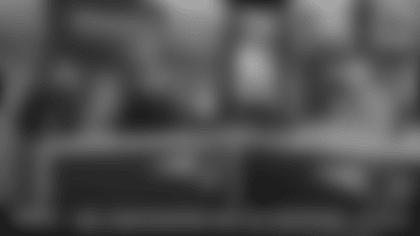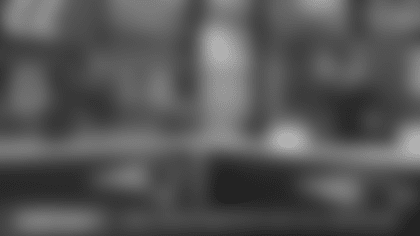[

]()
BB: I think everybody has the roster moves from over the weekend. Russell Stuvaints who was on our practice squad signed with Pittsburgh. So, we only have seven practice squad players as of today. That takes care of that. Otherwise, it is on to Arizona. This is a pretty impressive, young team. I think that Coach [Dennis] Green has done a really good job getting things going on the way that he wants them to be down there. I thought they played a really solid game against the Rams, especially on special teams. They had a 90-yard interception return called back on a close call that, had that not gone against them, it probably would have been a little bit of a different story in St. Louis. There are a couple of veteran guys on this team that are very impressive like Freddie Jones and Emmitt Smith. They have a lot of good, young players, especially on the defensive side of the ball. [They have] a couple of their offensive linemen and the receivers and quarterback that have been pretty impressive, too through preseason and in the Rams game. There are a lot of new faces down there, people that we haven't played against or haven't seen a lot of. We have a lot of work to do in terms of our preparation. They are a really good, young football team. They are very good in the kicking game and good on both sides of the ball. They are a physical team, they really hustle around and play with a good attitude. They have a lot of team speed on defense. I think those are our challenges from Arizona. Of course, internally, we have our own things to deal with. We have plenty of mistakes that we need to get corrected from our last game and things we need to do better if we are going to continue to have a chance to play well. There are a lot areas that we have to improve in. That is what we are up against this week.
Q: Why are you traveling on Thursday?
BB: It is kind of a long week between the two games and it is long trip, so we will try to get a little bit of that out of the way. We will have a full week before we leave and then review it down there.
Q: How were you able to use the extra time? Was it beneficial because this is a team you haven't played and you had more preparation time plus you had more time to correct some of your own things?
BB: They have only played one regular-season game and four preseason games. There were a lot of changes in preseason. Some of their players didn't play very much in preseason, guys like [Larry] Fitzgerald and Bryant Johnson and Emmitt Smith. There is only so much film you can look at. There just hasn't been a lot of exposure to them. Some of the things that you can see last year, they just started doing them differently this year, different schemes and guys like [Leonard] Davis who moved from right guard to left tackle. They have had some changes on their offensive line. It is what it is. Today is really our jump on it. Normally, we wouldn't be practicing on Tuesday. We were able to get working on Arizona today, so hopefully we can use a little bit of extra time against them because we don't know them very well.
Q: Will you have a walk through there on Friday?
BB: Yes.
Q: You usually minimize the importance of climate change. Since it is supposed to be really hot there, is going out there early at all because of the temperature change?
BB: Well, I don't think you are going to get used to that temperature in one day. Whatever it is going to be, that is what it is going to be. Again, it breaks up the week for us a little bit, and it is a long trip. We can get out there and get settled and get focused on the game.
Q: [Have] they been playing Fitzgerald out of the slot much?
BB: Well, he has only played in two games. He played in the opening preseason game against Minnesota in the slot. Then he missed the rest of the preseason. Last week, he played in the slot against the Rams. He has really only played in two games.
Q: With Fitzgerald in the slot, does that present a potential mismatch with coverage considering most defensive backs who play inside are smaller and he is a big guy?
BB: Well, he is just a pretty good receiver. He also has played some outside. It is not like [that] every time he lines up in there, but that is his primary position in their multiple receiver sets. He is going to be a challenge to cover wherever they put him, inside, outside, you name it. He has really good ball skills. He runs excellent routes. He is a good target. He doesn't need a lot of room to be open because he has such good hands and extends for the ball so well that he can bring it in. He made one catch on the sideline against the Rams. It was just one of those classic catches where his toes are in bounds and his whole body is stretched out six feet over the sideline, leaning out of bounds, but he is in perfect control the whole way. It was an excellent play. Plus, the opening play of the game on the flea-flicker where he went up and took the ball away from two defenders. He looks pretty good no matter where he is.
Q: Was he high on your [draft] board?
BB: Well, sure. He was a really good receiver and very productive. He is no secret. It's not like he was a sleeper in the draft now.
Q: You mentioned the Arizona special teams excelling over the weekend. You have had a fair amount of turnover on your special teams, Chris Akins is gone, Matt Chatham is out. How have your coverage teams been altered from last year and how are they affecting you right now?
BB: I think our coverage has been okay. We have some people that have moved into the picture there like [Dan] Klecko, Dexter Reid, guys like that. Asante [Samuel] has helped us a little bit there. I think that the coverage has been more of an issue in the punting game than what it was last year, but I think that has been okay. I think our kick coverage has been okay, again, with the notable exception of the Cincinnati game. It wasn't okay in that game, the punt coverage. A bigger part of the problem has been in the return game.
Q: No returns?
BB: Yes, our lack of returns, right. We haven't done much of anything either phase of the game, punt or kickoff returns in five games now.
Q: Is that attributable to situations not, for instance, the punt was wind blown that Deion [Branch] muffed the other day, so he wasn't going to get a return on that really anyway. Other times Bethel [Johnson] didn't go straight up the field. Troy [Brown] has been out. Has it been a product of coverage, blocking, return decisions, the elements?
BB: Yeah, all of the above. Well, if you don't handle the ball cleanly you are not going to get very many good returns. That has been a problem in every game. If you don't block well, that is a problem. If you have penalties, that is a problem. I would say everybody is joining in the party.
Q: If everybody is healthy, have you settled on a punt returner? Would Troy be the guy if he were available?
BB: Well, he certainly would be in there, yes. No question.
Q: Larry Izzo started the year with three tackles on special teams. What is it specifically that allows him to be so good in coverage? I am sure he is not the fastest or the strongest.
BB: But I think on special teams he has the right make up that you look for, and a lot of good special teams players are going to have a similar make up to that, about that size, about that kind of speed. He is quick. He is very instinctive. He is a smart guy. He works hard at it. He reads returns. He anticipates things well, and he is a pretty good open-field tackler. Those things are all positive for him. It is not all about how big you are in the kicking game. Quickness is important, speed is important and the ability to be able to play in space and play in a lot of unsettled situations, which pretty much everyone of them is. There are all different angles where the blockers are coming where the returner is, what angle he is going at, all of those types of things. Being able to process all of that in a hurry and make a good decision and then play athletically in the open field because it is so much more of a space game than it is an inline game when the ball is kick. Those are all strengths, and I think that Larry does a good job at them, along with Don Davis and a lot of other guys for us.
Q: Is he a guy that you can point to in special teams meetings to the younger players and say this is how certain things should be done?
BB: Sure. Larry does a lot of exemplary things both on and off the field in terms of his techniques, his recognition, but also his preparation in the classroom and on the practice field. I think he takes it from the beginning and follows through, all the way to the final product to the game. He has a very consistent effort all the way through and I think that shows up on Sunday.
Q: With Bethel, knowing that he is so explosive, is it hard because you just want him to hit it up in there where the run is assigned to go or because he is capable of making some things happen with his feet? Is it okay that he freelances a little bit and cuts back across the field and does some of that stuff?
BB: Well, the bottom line on your return game is production. First of all, it is ball security. They are kicking you the ball and you want to make sure at the end of the play, you end up with it. That is number one. Handling it, that is a big part of it, handling it cleanly, because that affects the timing of the play. Then the blocking and the blocking pattern that you have tried to create, it is never exact because there are so many variables in a kicking play – the hang time, the direction of the kick, the different speeds of various coverage players. The bottom line is to get everybody blocked so that the guy catching the ball at least has a chance to maneuver and get started. If guys are unblocked, it is pretty hard for a returner to deal with too many of those. You might be able to get by one but he is not going to be able to get by four or five of them, not if they are any good. All of those things are factors. At times we don't handle the ball cleanly, at times we do and we miss blocks. At times we handle the ball and block but get penalized. We miss hold ups on the line of scrimmage and punt returns. There are a lot of things that are wrong, and we just haven't had much production to this point in the season on either punt or kickoff returns other than a couple, very few number of infrequent positive return plays. We blocked a punt against Philadelphia, but just in terms of the return game itself, it hasn't been very productive.
Q: Are you surprised Emmitt Smith has lasted this long?
BB: The guy is an incredible player. He has been productive every single place he has ever been. He had huge production in high school and has done it all the way through in the NFL. You talk about thinking [if] there is a reason why there are hall of fame backs, that is a reason. There has been tremendous production, year after year after year after year with different guys in front of him and different defensive schemes he is running against, whether it was high school, college, professionally, he has just had a lot of substantial production for a long, long time. He is obviously doing a lot of things right.
Q: You have been watching Emmitt Smith for close to 20 years now, is that accurate?
BB: Yes, unfortunately.
Q: Has his style of play changed at all?
BB: Not dramatically. I think pound for pound he's probably one of the strongest players in the league. I think there are some differences but certainly some similarities to a runner like Curtis [Martin]. He has great vision. He really lowers his pads well. He plays with a lot of power and explosion. He's a hard guy to tackle, but he sees things very well. He finds the seams in the defense, and he runs with power and can get through those arm tackles because of his exceptional body lean and lower body playing strength.
Q: The season is early, but already you have been doing a lot of rotating players at different positions. What are the pros and cons of that rotation?
BB: I think, especially at this time of year, you're getting a lot of people that…nobody, or very few players, at this point have played a full game, even with one regular-season game, with it being one week into the season. Certainly nobody did it in preseason, so there is a little bit of a build up process there. It keeps everybody involved. It can create some different combinations and matchups for you. I think if your players are experienced and comfortable and used to playing with each other and playing together, that I don't see it really as any kind of a problem. At some point along the line, if you ever have to not be in that rotation, then everybody has a lot more experience than they would if it was one guy playing and the other guy not playing. That being said, there are plenty of those situations on the team, too, so I think where you have a good situation, a good competitive situation, and where you can rotate and you feel like is a positive for your team, then you do it. If you feel like it's taking something away from either the efficiency or the talent you're putting on the field, that's probably a reason not to do it. There is certainly a case for both scenarios.
Q: Is there a chance that a guy might lose the flow of the game if he's not out there every play?
BB: I don't know. Nobody plays every play. It was back in the '60s when guys went both ways. Now everybody, to a certain degree, is a situational player, and some more than others. But that's the way it is. It's like that in a lot of sports. You see guys come in and pinch-hit. They get one turn at bat, or they come in and have to make a couple of baskets at a key point in the game. In football, you get certain players that you want to take advantage of their skills in certain situations, and when they come up they play and when they don't come up they don't play. So, a player has got to be able to handle that role and be productive in it, or he probably isn't going to be in that situation very much.
Q: Does the ability to rotate players or play certain guys in certain situations speak to the overall depth of your roster?
BB: Well, I think if those players can play effectively in those situations then we do have depth. How much depth we actually have remains to be seen. I think it's a little early at this point to fully answer that question, but we're finding out as we go.
Q: How is Ty Law? Will he be available to play on Sunday?
BB: Well, we'll give an injury report tomorrow. I think he's doing better, but we'll put the report out tomorrow.
Q: What is the status of Kevin Faulk?
BB: The same thing. We'll put his status out tomorrow with everybody else.
Q: Can you talk about the maturation of Eugene Wilson?
BB: Well, I think Eugene was able to spend a lot of time this year during training camp at the safety position, something he didn't do last year. He spent really all of his time at corner. This year we kind of split it between safety and corner. He still has some corner responsibilities even when he plays safety, and we know that if we have to play him at corner that he's trained to do that and has the skill and confidence to do it. I think his versatility back there has been a really big plus for us defensively. I thought he played well against the Colts. But that's one of those positions where, you talk about situational players, that's really what a safety is. He gets four, five, six plays a game, usually, that he can be a factor on. How he does on those handful of plays determines whether he plays well or not. The other 50 can be great, but if he's not really threatened or challenged on those plays, it doesn't really make any difference. I could be back there. If the ball never gets there, it doesn't matter. Those handful of plays when he has to make the play or is involved in the play, then those are big plays. If he missed them we give up a lot of yards or a lot of points. If he makes them, we don't. I'm not saying just Wilson, any safety. That's the nature of the position, so it's very situational. Sometimes the best thing a safety can do is not be involved in any plays. That means he's in position. That means that the quarterback isn't trying to challenge him in that part of the field because it looks like it's pretty securely defended, and [it means] in the running game that the people up front are doing a good enough job at keeping the ball from getting back to him. It's hard to evaluate a safety just on production alone. You get into that a lot in college when you're evaluating guys. A guy has a lot of production, well, sometimes that's good thing, and sometimes that isn't a good thing. It just depends on the circumstances that that production is coming in. But it can be frustrating. I think that's why those guys have to play with a lot of discipline. I think Eugene does that. For a young guy he's pretty smart, and he's pretty disciplined and pretty mature that you try to run around and make plays that you shouldn't be making and pretty soon you end up giving up plays that you really shouldn't be giving up. There's an element of playing the defense, playing within the system, being there to make the plays that you need to make without taking yourself and exposing the position to try to do something that isn't really your primary responsibility. So, that level of maturity and understanding and discipline is a key for that spot.
Q: Are there certain things you want to work on this week that you saw in the Colts game, or do some things go on the back burner to work on situations specific to playing against Arizona?
BB: I don't know if I would quite put it that way, but I think we want to try to address everything. I don't know what they're going to do, but I'm sure that the Cardinals, being a well-coached team like they are, they're going to see things that they think we're not very good at or we didn't execute very well and try to see whether we're any better at it. That's why you kind of have to work on everything because when they bring their attack, they can attack wherever they want. If we don't take care of those problems, they will just continue to be problems. I think a big part of our game right now is to improve in every area that we can. Who knows which areas are going to be the ones that get stressed the most this week, but eventually they're all going to come back into play again, and probably sooner rather than later. So, taking care of our own situation and pulling those areas up is going to be important as is preparing for the Cardinals and knowing their team and knowing the strengths and weaknesses of their players and their scheme. I think we're kind of in a combination of things there.
Q: Playing a coach like Dennis Green who you haven't played against in awhile, is there any value in going back to look at film from when he coached in Minnesota?
BB: We've done that. We did that a little bit in the offseason because we knew we were playing him early, and we didn't have any film to look at. The only thing we could look at was what he had done the last time he was coaching. We checked those things out in the offseason and are aware of some of the tendencies and the types of things he liked to do when he was with the Vikings. Some of those elements still appear to be in place. I would say some of them have definitely changed. There are some things that there is not enough evidence in to know whether some of the special plays they ran at Minnesota, whether that is in this new offense or not. There just hasn't been enough exposure to it. I think it's an aspect of the preparation. After four or five, four preseason games and a regular-season game, you're starting to get a pretty good feel of where they are or where they are at this point. I think a lot of that will probably stay in place. I'm sure that as each week goes along they will evolve and expand a little bit just like we all will. Where that expansion will lead, I don't know how much of that will lead to what they're doing now or how much of it will lead back to what maybe he did more of in Minnesota. I don't know, but we definitely went back and did that in the offseason and checked that out. At this point, most of our emphasis is on what they are currently doing, but there is an awareness that we know what has gone on in the past and some of the things that hurt us like when we played them in 2000.
Q: Are these two weeks like two opposite ends of the spectrum in that you played the Colts who you have played a lot and know well, and now you are playing the Cardinals who you haven't seen that much?
BB: Well, I think there's a little bit of a contrast there, but at the same time I think that there are a lot of similarities between the Colts and Cardinals which goes back to my feeling that we need to fix a lot of things that we didn't do well in the game Thursday night. I think defensively they have a lot of team speed. They run a lot of stunts. They have a system defensively similar to what the Colts have, and they also have a similar group of players in terms of really athletic guys, fast guys, quick guys that stunt well. Offensively, they like the three-receiver sets. They're not in them exclusively, but they like them. Even though the Colts weren't always three receivers, when they flexed Dallas Clark out, he's pretty close to being another receiver, and we saw that. So, I think there are a lot of elements to the game there that are similar. Also in the kicking game, the Cardinals have excellent specialists. They have two good returners. They have two good kickers. They have a good snapper. They have a lot of linebackers and safeties and a couple of their offensive skill guys, like [Josh] Scobey for example, that are similar to the Colts' core of special team players, which are mainly made up of their linebackers, a couple of defensive linemen, safeties and a couple of their running back-tight end types. I think that there are a lot of similarities in kind of the make up of the two teams and some scheme similarities as well. Even though, you're right, the Colts are at one point in their development and the Cardinals are at another point, but in some respects that puts them a lot closer than, to say, the contrast between Carolina and Indianapolis where you're looking at…you probably couldn't get two teams that are more different in the way that they do things and [are] still both very successful. I don't know if that answers your question or not.
Q: Why has your team been able to succeed in the final moments of a game?
BB: On a going forward basis, you just have to prepare for each one of those situations, and you don't know which ones are going to come up. Some of the games that we've won I think the credit goes to the players that made the plays that helped us win those games, whether it was the guy kicking the ball, the guys playing defense, the guys moving the ball to put the team in position to score or score offensively. Those are the guys that make the plays, and it's just like you said. It comes down to a few plays. If you make them, you have a chance. If you don't make them, you go home and nobody is happy about it. Going forward, you just never know what set of plays it's going to come to this week and what situations are going to be the key situations in this game or any other game in the future. You just try to cover all your bases on that stuff and react to them as they come along.
Q: Is there a way to prepare your guys for the type of intensity that exists in the closing moments of a game?
BB: I think that in terms of the magnitude of the play, I'm not really sure about that. But as you get to the end of the game, there are times and score situations that are factors in the game that aren't factors in the first quarter. You run a play in the middle of the first quarter, you're not thinking about clock management. You're just trying to make positive plays at that point. When you get to the end of the game, a gain of 10 yards might be the worst thing in the world if you stay in bounds and keep the clock running. The whole situation might dictate that you have to stop the clock. That's more important than the 10 yards or 15 yards or whatever it is. Those situational plays are all defined by the situation that presents itself. You try to cover that on the practice field. You can't cover them all out there. You try to cover them on tape and in the meetings. Then when the situations come up, if you can anticipate it, you talk about it on the sideline, 'Hey, here's what the deal is. Here's what we're looking to do. Here's what we're going to call.' Each play is a game within itself there, but in terms of me being able to sit here and tell the team, 'Okay, here's what is going to happen this week,' there's no way. You just try to cover things with a broad brush, and say, 'Okay, here's our two-minute plan. Here's our end-of-the-game red area plan. Here's our last play stuff. Here's what we expect them to do when the game is on the line. These are the types of plays they like to run. These are the types of defenses they like to run. Here's our one-play situational play, a kickoff after a safety or no-huddle field goal, those kinds of things.' You work on those plays. You can't get them all every week, but if you do some the next week, some the next week, some the next week, then by that point they start to recycle. At least you build up the reps over a period of time.
Q: I know that [Tom] Brady brings that calm to the offensive side, but are there guys on the defensive side that kind of provide that same crunch-time, step up the level type of performance?
BB: Yes, I think you have to do that as a team. It just really comes down at that point to execution. Whatever the defense is, it isn't like we're going to sit there and say, 'Okay, with 40 seconds left in the game this is the call we're going to make.' It all depends, but whatever it is, I think hopefully, what everybody is thinking about at that point is executing the play. 'Here's what we have to do. This is what my job is on this play. I have to make sure I get that taken care of. I can't worry about what the guy next to me is doing. I have confidence in him that he's going to do what he's supposed to do.' Hopefully you can go out there and execute all 11 guys efficiently as a team and be able to be successful. But it really comes down to execution at that point, and that's all 11 guys. It takes one guy to be out of position, and any good offensive team will take advantage of it. I think that really has to be the focus at that point, is the execution. That, sometimes, involves a lot of communication






































